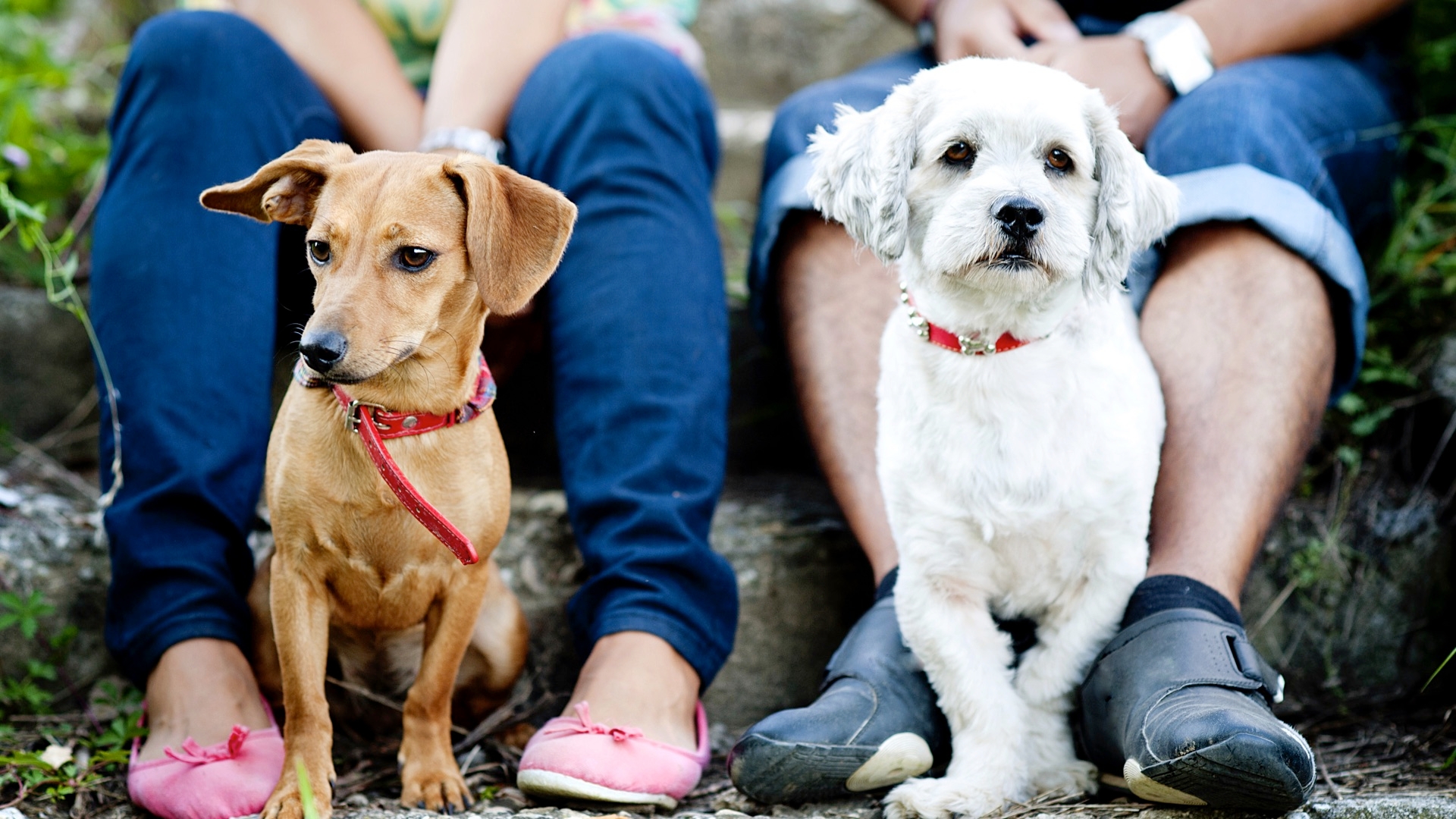How To Choose A Dog:
Summary:
If you're thinking about getting a dog and you've never had one, please do some research first. Learn about what's involved in having a dog — basic dog care, medical needs, training and behavior. In particular, ask yourself the following
By Sherry Woodard
If you're thinking about getting a dog and you've never had one, please do some research first. Learn about what's involved in having a dog — basic dog care, medical needs, training and behavior. In particular, ask yourself the following
-
Do I have the time to give a dog the love and attention she deserves?
-
Can I offer her daily exercise and interaction with people and other dog friends (if appropriate)?
-
Can I afford the costs of having a dog (food, routine vet care, and possible additional medical costs, such as medication)?
-
Are my emotional expectations realistic? (A dog is not a furry little person.)
-
Will she be living in the house as a valued family member? (Dogs are social animals and don't do well living alone outside.)
Should I get a puppy?
One of the frst questions that people ask themselves is whether to get a puppy. /ots of people don't realize that puppies need almost constant attention (almost as much as a human baby). Do you have the time or the inclination to raise a puppy? If you're gone for long periods of time, are you willing to pay for daycare or a sitter? Do you have the time to properly train your puppy? All puppies and dogs need to learn how to be well-behaved family members.
To grow into emotionally balanced and safe dogs, puppies must also be socialized. They must be trained to act appropriately in different settings — around children and other animals, on busy city streets, in parks, around people who are strangers.
Other considerations when getting a puppy Think about how big he'll be and how active he'll be when he grows up. If you live in an apartment in a city, a large dog may not be the best choice. If you're a couch potato, you may want an older or more sedentary dog.
Should I get a purebred dog?
The next question people usually ask is whether they should get a purebred dog. If you decide that you want a purebred, please investigate the different breeds carefully before choosing a dog. Dog breeds vary quite a bit in their temperament, the amount of exercise they require, and the amount of care (e.g., grooming) they might need.
Almost every dog breed was created for a specific purpose; hunting, herding, and guarding are examples. Knowing the characteristics of the breed can help you decide whether a dog of a particular breed will fit into your family's lifestyle. Your plain old mutt is actually a much more adaptable dog for the way that most people live today, since most people don't need a dog who excels at hunting or herding!
Also, mutts are often healthier animals, because of "hybrid vigor"; many purebred dogs have breed-specific health problems. For example, Labradors often suffer from hip and elbow dysplasia, and Chihuahuas can have heart problems and hypoglycemia.
Where should I get my dog?
There are many wonderful dogs (including purebreds) at your local shelter. When you choose one of these dogs, you often get the added bonus of knowing that you have saved a life. Getting a dog from a breed rescue group is another option to consider if you have decided upon a particular breed. These groups rescue purebred dogs that have been given up, for one reason or another, and find new homes for them. Some breeders also do rescue for their breed. To find a rescue group for the breed you're interested in, do a search on the Internet (for example, search for "dachshund rescue").
Petfinder.com is also a great resource when looking for a specific breed or breed mix. This website allows you to search for dogs available through rescue groups and shelters by location, breed, age and gender.
We don't recommend that you buy an animal from a pet store. Most pet stores buy from puppy mills and "backyard breeders": people who are just in it for the money and often don't care about the health or well-being of the dogs.
As an organization committed to reaching a day when every pet has a loving home, it goes without saying that Best Friends encourages everyone who is looking to bring a pet into the family to choose adoption over purchase. Although we recognize that there are caring and reputable private breeders who breed responsibly and ethically, it's difficult for us to endorse any kind of breeding while so many animals are dying in shelters. How do I choose a dog who will be a good fit for me?
First, consider what you will want this dog to be doing in daily life. Will the dog be:
- Playing with children?
- Living with cats?
- Living with or playing with other dogs?
- Going to dog parks or doggie daycare?
- Learning to compete in dog sports such as agility or flyball?
- Going running or hiking with you?
Not every dog can or will be appropriate for all of these things. Choose a dog whom you will be ready to learn and grow with. Before going to meet a potential canine candidate, read "Dog Body Language" to help you recognize the dog's comfort level. When you go to meet the dog, take some small, soft chicken treats (not dry biscuits) and a couple of toys. See if the dog takes the treats gently and wants to play with a toy. If the dog doesn't want the treats, he/she may be ill or fearful. Don't be alarmed if the dog doesn't want to play with the toy. It can take a little time for a dog to warm up to the idea of playing, or the dog may not be feeling well.
To fnd out the dog's comfort level with handling, ask his caregivers if you can give him a quick little exam. Touch his ears, look at his teeth, lift a paw or two, give him a hug, lift the dog. If the dog is small, you may want to see if he is comfortable being carried. Even large dogs will be lifted if you are helping the dog onto a grooming table or into a tall vehicle. Every dog will need grooming and vet care in the future, and handling by strangers often happens in any public setting.
When you're doing the exam, use caution. Many dogs are fearful about being handled by strangers. Don't be shy in asking for help. The dog's caregiver or the adoption staff should know something about each dog's behavior. If they can't help you with introductions or with handling the dogs, ask if anyone else can help you. If not, I recommend that you go elsewhere to adopt.
If possible, take your potential new family member out to meet dogs, cats, children and other adults. See how the dog acts on leash. Watching the dog's comfort level overall in public will help you know if this dog is going to enjoy and be safe doing the things you plan to share together. One caveat, though, about the dog's behavior It may change some once he is home and more comfortable.
Many rescued dogs come with a few challenges (behavioral or physical) that can be overcome with a bit of patience and understanding. Some dogs in need of new homes have disabilities, such as blindness or deafness, or chronic medical conditions, such as diabetes or thyroid issues. Caring for a special-needs pet is often not as daunting as it seems. Dogs with disabilities often surprise their people with how resilient and adaptable they are. Special-needs pets can teach us a lot about compassion, acceptance and perseverance.
If you choose a dog who lacks social skills (and many do), please plan to help this dog become more comfortable in our human world. Many of the resources in Best Friends' pet care library describe simple, positive ways to do this. It is important to teach and reward wanted behavior so your dog develops good manners.
In fact, socialization is a lifelong process. All dogs should be socialized throughout their lifetimes to become and stay relaxed and comfortable in different situations. Even if you are not a very social person, you should help your dog to trust some other people, since the more social the dog is, the safer the dog will be in our human world. Most bites happen when a dog is fearful.
Having a great relationship with your dog is based on building a foundation of trust. If you read through the rest of the resources in Best Friends' online library, you can help to set a dog up for great success as a member of your family for life. Remember, you will be responsible for this dog's behavior wherever he goes and with whoever he meets. .eep him happy, healthy and safe.
Sherry Woodard is the animal behavior consultant at Best Friends. She develops resources and provides consulting services nationally to help achieve Best Friends' No More Homeless Pets mission.


